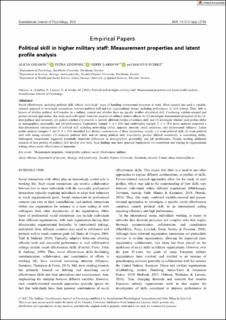| dc.description.abstract | Social effectiveness, including political skill, reflects individuals’ ways of handling interpersonal processes at work. Most research has used a variable-oriented approach to investigate associations between political skill and key organizational factors, including performance, in civil settings. Thus, little is known of whether political skill transfers to a military context and whether there are specific profiles of political skill. Combining variable-oriented and person-oriented approaches, this study used self-reports from two samples of military student officers to: (1) investigate measurement properties of the 18-item political skill inventory; (2) explore whether it is possible to identify different profiles of political skill; and (3) investigate whether such profiles differ in demographics, personality, and job performance. Exploratory (sample 1: n = 185) and confirmatory (sample 2: n = 183) factor analyses supported a four-dimensional representation of political skill including networking ability, apparent sincerity, social astuteness, and interpersonal influence. Latent profile analysis (samples 1 and 2: N = 368) identified four distinct combinations of these dimensions, namely: (1) weak political skill; (2) weak political skill with strong sincerity; (3) moderate political skill; and (4) strong political skill. Importantly, profiles differed consistently in networking ability. Subsequent comparisons suggested potentially important differences in demographics, personality, and job performance. Despite needing additional research of how profiles of political skill develop over time, these findings may have practical implications for recruitment and training in organizational settings where social effectiveness is important. | |

